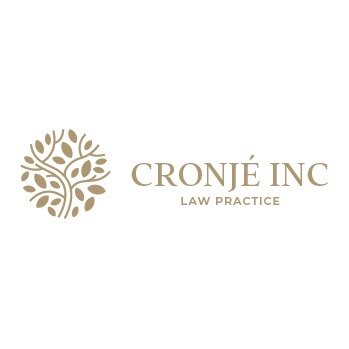Best Agriculture Lawyers in Windhoek
Share your needs with us, get contacted by law firms.
Free. Takes 2 min.
List of the best lawyers in Windhoek, Namibia
About Agriculture Law in Windhoek, Namibia
Agriculture is a vital sector in Namibia, contributing significantly to the country's economy. In Windhoek, as the capital city, agriculture law encompasses various regulations and policies that govern farming activities, land use, water rights, environmental protection, and labor relations. Given Namibia's arid climate, sustainable agricultural practices and efficient resource management are critical. Agriculture law in Windhoek aims to balance these needs while promoting economic growth and preserving natural resources.
Why You May Need a Lawyer
There are several situations where individuals and businesses in the agricultural sector might require legal assistance:
- Land disputes or issues concerning land ownership rights.
- Negotiating and drafting agricultural contracts and agreements.
- Navigating regulations related to environmental protection and land use.
- Issues related to water rights and resource access.
- Employment and labor law issues affecting farm workers.
- Disputes involving agricultural subsidies and financial support programs.
- Compliance with government policies and regulations on agricultural practices.
Legal advice can help safeguard interests, ensure compliance, and resolve disputes effectively.
Local Laws Overview
Windhoek's local laws on agriculture are influenced by national legislation and regional policies that focus on sustainable development, environmental conservation, and economic growth. Key aspects include:
- Land Reform: Laws that aim to ensure equitable distribution of land and address historical disparities.
- Water Management: Regulations on the sustainable use of water resources given Namibia's semi-arid climate.
- Environmental Protection: Policies that mandate environmental impact assessments for large-scale farming operations.
- Labor Regulations: Standards for employment conditions in the agricultural sector, including wages, safety, and rights of workers.
- Trade and Exportation: Rules governing the export of agricultural products, quality standards, and international market access.
Staying informed about these laws is crucial for any agricultural enterprise operating in Windhoek.
Frequently Asked Questions
1. Do I need a permit to farm in Windhoek?
Yes, depending on the type and scale of your agricultural activities, you may need various permits related to land use, water rights, and environmental management.
2. How can I verify land ownership in Windhoek?
Land ownership can be verified through the Deeds Registry, with assistance from a local attorney or land surveyor.
3. What are the tax implications for agricultural businesses in Namibia?
Agricultural businesses in Namibia are subject to corporate taxes, and there may be additional considerations depending on subsidies or grants received.
4. How do I address labor disputes on my farm?
Resolving labor disputes often requires understanding employment law, negotiations, or legal proceedings. It's advisable to consult a lawyer specializing in labor law.
5. What are the basic requirements for exporting agricultural products?
Basic requirements include adhering to quality standards, obtaining necessary certifications, and ensuring compliance with Namibian and international trade regulations.
6. Are there specific environmental regulations for agriculture in Windhoek?
Yes, environmental regulations require assessments and activities to minimize environmental impact, crucial for approval of large-scale operations.
7. Can a foreign national own agricultural land in Windhoek?
While foreign nationals can own land, there are restrictions and additional processes involved. Legal advice is recommended for navigating these complexities.
8. What is the role of traditional authorities in agricultural land allocation?
Traditional authorities may have jurisdiction over communal lands and could influence allocation and access to these areas for agricultural purposes.
9. How can I access government subsidies for agriculture?
Subsidies are available through various government programs, requiring specific applications and compliance with set conditions.
10. What legal steps are involved in starting a commercial farm?
Legal steps include registering the business, securing permits, and ensuring compliance with all local and national regulations.
Additional Resources
For further assistance, several resources can be beneficial, including:
- The Ministry of Agriculture, Water, and Land Reform, which provides guidance and information on policies and subsidies.
- The Namibia Agricultural Union (NAU) supports local farmers and offers resources and advocacy.
- Legal Aid services in Namibia can provide assistance to those who qualify and require legal help.
- Local law firms specializing in agriculture that offer tailored legal advice and services.
Next Steps
Should you require legal assistance in the agricultural field, consider taking the following steps:
- Consult with a lawyer specializing in agriculture to understand the specific legal requirements for your situation.
- Gather all necessary documentation, including land titles, existing contracts, and relevant correspondence.
- Reach out to local farmer associations or unions for advice and support.
- Stay informed about any changes in local laws and regulations by subscribing to updates from legal services or governmental bodies.
Taking proactive measures and seeking appropriate legal counsel will help protect your interests and ensure compliance with relevant laws in Windhoek, Namibia.
Lawzana helps you find the best lawyers and law firms in Windhoek through a curated and pre-screened list of qualified legal professionals. Our platform offers rankings and detailed profiles of attorneys and law firms, allowing you to compare based on practice areas, including Agriculture, experience, and client feedback.
Each profile includes a description of the firm's areas of practice, client reviews, team members and partners, year of establishment, spoken languages, office locations, contact information, social media presence, and any published articles or resources. Most firms on our platform speak English and are experienced in both local and international legal matters.
Get a quote from top-rated law firms in Windhoek, Namibia — quickly, securely, and without unnecessary hassle.
Disclaimer:
The information provided on this page is for general informational purposes only and does not constitute legal advice. While we strive to ensure the accuracy and relevance of the content, legal information may change over time, and interpretations of the law can vary. You should always consult with a qualified legal professional for advice specific to your situation.
We disclaim all liability for actions taken or not taken based on the content of this page. If you believe any information is incorrect or outdated, please contact us, and we will review and update it where appropriate.

















